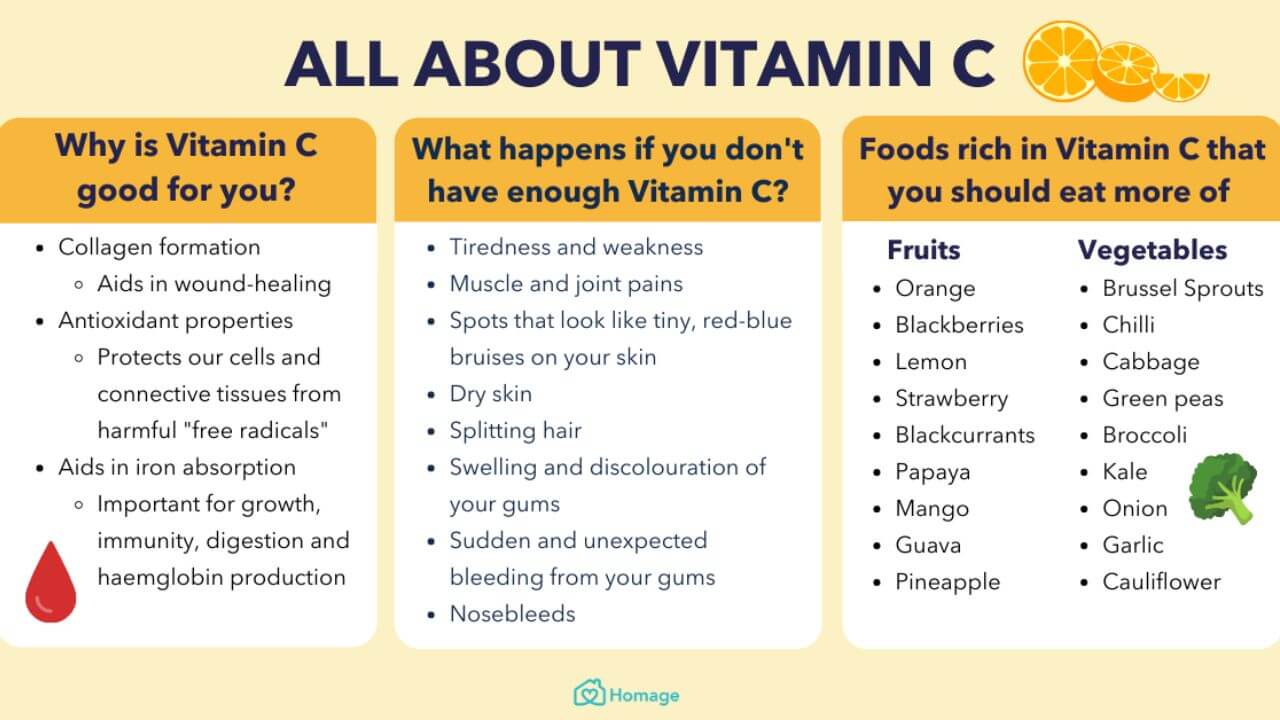Are you someone who is trying to live a healthier lifestyle? Or maybe you're already on the path of eating healthier and exercising regularly but are looking for ways to supplement your current routine.
If so, then vitamin C supplements may be something worth considering - especially since vitamin C is usually referred to as an essential nutrient that can help maintain overall health and support the immune system.
We will take a deeper look into oral vitamin C supplements exploring their benefits, and how they might fit into your daily regimen.

Introduction
Vitamin C, also known as l ascorbic acid, is a crucial nutrient that our bodies need for numerous critical functions. It's a water-soluble vitamin that can't be produced by the body, making it essential to obtain through diet or supplementation.
The role of Vitamin C is numerous from boosting the immune system to promoting wound healing. Since our bodies cannot produce Vitamin C, so we need to obtain it from our diet or supplements. This article delves into the benefits of Vitamin C supplements and their role in maintaining our overall health.
Vitamin C is a potent antioxidant that helps protect the body against oxidative stress. It's also vital for the synthesis of collagen, a protein that helps maintain the health of skin, blood vessels, and bones. Furthermore, Vitamin C aids in iron absorption, which is crucial for red blood cell production.
It is a powerful antioxidant that can strengthen your body's natural defenses by protecting its cells from harmful molecules called free radicals. Moreover, Vitamin C is vital for the production of collagen, a protein that aids in wound healing.
The role of Vitamin C supplements comes into play when dietary intake is not sufficient. Supplements can help fill the nutritional gap and ensure that your body gets the required amount of this vital nutrient.
Vitamin C Key Takeaways :
- Is essential for collagen formation and maintaining youthful-looking skin.
- Plays a significant role in lowering the risk of cardiovascular disease.
- Promotes the absorption of Iron for hemoglobin formation.
- Lowers the risk of Age-related macular degeneration and cataracts
- Cannot be stored by the body so a daily intake is essential.

What are Vitamin C Supplements?
Vitamin C supplements are dietary supplements designed to provide more Vitamin C intake than what can be obtained through diet alone. These supplements come in various forms, including tablets, capsules, and powders, and are often used to prevent or treat a vitamin C deficiency.
When are Vitamin C Supplements Necessary?
Vitamin C supplements may be necessary in cases of dietary insufficiency, severe vitamin C deficiency (known as scurvy), and certain medical conditions. They may also be recommended for individuals with increased needs due to stress or illness.
Benefits of Vitamin C Supplements
Vitamin C supplements offer numerous health benefits, including:
- Reducing the risk of chronic diseases: Vitamin C's potent antioxidant properties can boost your body's immunity, thereby reducing the risk of chronic diseases.
- Managing high blood pressure: Studies have shown that Vitamin C can help lower blood pressure in both healthy adults and those with high blood pressure.
- Lowering the risk of cardiovascular disease: Several factors contributing to heart disease, including high blood pressure, high LDL cholesterol levels, and low levels of HDL cholesterol, can be controlled with the help of Vitamin C supplements.
- Reducing blood uric acid levels and preventing gout attacks: High levels of uric acid in the blood can lead to gout, a type of arthritis. Vitamin C supplements can help reduce these levels, thereby preventing gout attacks.
- Role in wound healing and collagen formation: Vitamin C plays a crucial role in wound healing due to its involvement in the production of collagen, a protein that helps in the healing process.
- Antioxidant properties and protection against free radicals: As a potent antioxidant, Vitamin C can strengthen your body's natural defenses and protect your cells from harmful free radicals.
- Age-related macular degeneration: Vitamin C may play a role in deactivating free radicals that cause cell damage in the eyes.

Vitamin C and Health Risks
While Vitamin C supplements offer numerous health benefits, it's essential to be aware of the potential risks associated with excessive intake:
- Risks from excessive levels of Vitamin C: Consuming too much Vitamin C can lead to diarrhea, nausea, and stomach cramps.
- Interactions with medications: Vitamin C can interact with certain medications, including chemotherapy drugs, statins, and blood thinners.
- Side effects of Vitamin C supplements: Some people might experience side effects such as headaches, insomnia, and skin flushing.
How to Choose a Good Vitamin C Supplement
Choosing a vitamin C supplement can be a daunting task given the wide variety of options available on the market. However, by considering the following factors, you can make an informed decision that best suits your needs.
Quality and Purity
The quality and purity of oral vitamin C supplements are paramount. High-quality supplements are free from contaminants and the amount of vitamin C content is clearly stated on the label. Here are some tips to ensure you're getting a quality product:
- Third-Party Testing: Look for supplements that have been tested by a third party. These independent organizations verify the quality, purity, and potency of the supplement, ensuring you're getting what's promised on the label.
- Reputable Brands: Choose supplements from reputable brands. These companies have a track record of quality and safety.
- Avoid Fillers and Additives: Some supplements contain unnecessary fillers and additives. Check the ingredient list and opt for supplements with minimal extra ingredients.
- Natural Ingredients: Opt for brands that use natural ingredients that are low in sugar and have no artificial colors or flavors.

Dosage
The dosage of vitamin C you need can vary based on several factors, including your age, sex, and overall health. The Recommended Dietary Allowance (RDA) for vitamin C is:
- For men, 90 mg per day.
- For women, 75 mg per day.
However, these amounts can increase for individuals who are pregnant, breastfeeding, or smokers. It's always best to consult with a healthcare professional to determine the appropriate dosage for your specific needs.
Form
Vitamin C supplements come in various forms, including tablets, capsules, chewables, powders, and liquids. The best form for you depends on your personal preference and lifestyle:
- Tablets and Capsules: These are convenient and easy to take with a glass of water. They also allow for precise dosages.
- Chewables: These are a good option for those with difficulty swallowing pills. They often come in a variety of flavors.
- Powders and Liquids: These forms can be mixed into drinks or food. They can be a good option for those who prefer not to swallow pills or want to adjust their dosage more precisely.
Remember, the most important thing is that you're comfortable with the form of the supplement and that it fits into your daily routine. This will make it easier for you to take it consistently, which is key for reaping the benefits of vitamin C.

Upper Limits
The upper limit for vitamin C intake refers to the maximum amount of vitamin C that can be consumed daily without causing harm. For adults, the tolerable upper intake level (UL) is 2,000 milligrams (mg) per day.
Consuming more than this amount can lead to side effects such as diarrhea, nausea, and stomach cramps.
In rare cases, high-dose Vitamin C can cause more serious health issues, such as kidney stones. It's important to remember that the upper limit includes vitamin C from all sources, including food, drinks, and supplements.
While it's difficult to exceed the upper limit through diet alone, those taking vitamin C supplements should be mindful of their total daily intake.
Absorption
Vitamin C absorption refers to how well the body can take in and utilize this nutrient. The body absorbs vitamin C through the intestines, and the efficiency of absorption decreases as intake increases.
When intake is low, up to 90% of vitamin C can be absorbed. However, when intake exceeds 1,000 mg per day, the absorption rate drops to less than 50%.
This means that taking high-dose supplements may not necessarily result in higher levels of vitamin C in the body. Furthermore, any excess vitamin C that the body doesn't use is excreted in the urine.

Interactions with Medications
Vitamin C can interact with certain medications, altering their effectiveness. For example, it can enhance the absorption of iron, which can be beneficial for those with iron deficiency anemia but problematic for those with conditions that cause iron overload.
Vitamin C can also decrease the effectiveness of certain types of chemotherapy and radiation, and it can interact with drugs like warfarin, a blood thinner, altering their effects. Therefore, it's crucial to discuss with a healthcare provider before starting vitamin C supplements, especially for individuals on medication.
Use in Cancer Treatment
The role of vitamin C in cancer treatment is a topic of ongoing research. Some studies suggest that high doses of vitamin C, administered intravenously, can help improve the effectiveness of chemotherapy and reduce its side effects.
Vitamin C's antioxidant properties may also help protect healthy cells from damage caused by chemotherapy drugs.
However, vitamin C can also interfere with certain types of chemotherapy and radiation, making them less effective. Therefore, it's crucial for cancer patients to discuss the use of vitamin C supplements with their healthcare provider.

So What Are Vitamin C Supplements Good For You?
Vitamin C supplements are a great way to get the daily recommended intake of this important nutrient. From boosting your immune system to helping your body absorb other essential vitamins and minerals, vitamin C supplements can offer a large range of health benefits.
Plus, they're easy to take and come in a variety of formats. So whether you're looking to maintain your overall health or target a specific issue, vitamin C supplements are a great option.
With so many benefits, it's no wonder why vitamin C is one of the most popular supplements on the market. While it's best to get vitamin C from a varied diet rich in citrus fruits and vegetables, supplements can help fill nutritional gaps and prevent deficiencies.

Frequently Asked Questions About What Are Vitamin C Supplements Good For?
With all the different brands and types of Vitamins out there, how do you know which one is right for you?
We've compiled a list of the most frequently asked questions about Vitamin C supplementation so you can make an informed decision.
Here are some frequently asked questions about Vitamin C supplements:
Is it OK to take vitamin C supplements every day?
Yes, it is generally safe to take vitamin C supplements every day. Vitamin C is a water-soluble vitamin that is not stored in the body, so it must be replenished daily.
Taking a vitamin C supplement can help ensure you are getting enough of this important nutrient. However, it is important to check with your healthcare provider before taking a vitamin C supplement, as taking too much can cause side effects.
Is it good to take vitamin C dietary supplements?
It depends on your individual needs. Vitamin C is an essential nutrient and is important for a variety of bodily functions. If you have a deficiency in vitamin C, then it can be beneficial to take a supplement.
However, if you are getting enough vitamin C from your diet, then taking a supplement is not necessary. It is always best to consult with your healthcare provider to determine the best course of action for your individual needs.
Which vitamin C is best to take?
The best form of vitamin C to take depends on your individual needs and preferences. Some people prefer a supplement containing ascorbic acid, while others prefer a more natural form of vitamin C, such as acerola cherry or camu camu.
Additionally, some people may find that they absorb certain forms of vitamin C better than others. It is best to speak with a healthcare professional to determine which form of vitamin C is best for you.
Is 1000mg of vitamin C too much?
It is possible to consume too much vitamin C, and it is generally recommended that adults do not exceed 2000mg of vitamin C per day. Vitamin C is a water-soluble vitamin, meaning that any excess is excreted in the urine and not stored in the body.
However, consuming too much vitamin C can lead to side effects such as nausea, abdominal pain, and diarrhea. Therefore, it is important to always follow the recommended dosage for any vitamin or supplement.
What is the downside of too much vitamin C?
The main downside of taking too much vitamin C is that it can cause digestive upset, such as diarrhea, nausea, and abdominal cramps. It can also lead to kidney stones in some people.
Taking more than the recommended daily allowance (RDA) of vitamin C can also lead to an accumulation of oxalate in the body, which can further increase the risk of kidney stones.
Additionally, taking too much vitamin C can interfere with the absorption of other nutrients, such as iron, and can lead to an imbalance in the body.





